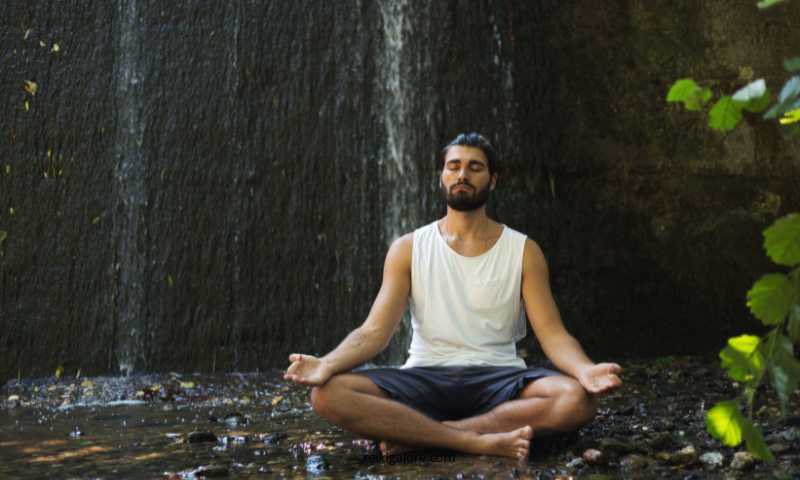Some people believe that Meditation is a sin, while others feel that it is a form of self-care and relaxation. No matter what your personal beliefs may be, it is important to understand both sides of the argument before making a decision.
In Christianity, meditation is not a sin
Meditation is permitted as long as it is done to concentrate on Jesus, God, or the Bible. It only turns into a sin when you employ meditation to completely empty your thoughts and divert your attention from the Lord.

What Is Meditation and Where Does It Come From?
Meditation is a practice in which an individual uses a technique, such as focusing their mind on a particular object, thought, or activity, to train attention and awareness, and achieve a mentally clear and emotionally calm, and stable state.
Meditation has its origins in ancient spiritual traditions, such as Hinduism and Buddhism, but it is now also practiced by people from various religious and non-religious backgrounds as a means of relaxation, stress reduction, and self-improvement.
The Role of Meditation in Different Religious Traditions
Meditation has played a significant role in many religious and spiritual traditions throughout history.
- In Hinduism, meditation is seen as a way to gain insight into the true nature of reality and to cultivate spiritual virtues such as compassion and love.
- In Buddhism, meditation is an essential aspect of the path to enlightenment and is considered a means of transforming the mind and achieving inner peace.
- In the Christian tradition, meditation has been used as a way to connect with God and deepen one’s spiritual practice.
- In Sufism, a mystical form of Islam, meditation is seen as a way to experience the divine presence and cultivate spiritual qualities such as patience and gratitude.
- In Judaism, meditation is often practiced as a means of personal and spiritual growth and is seen as a way to connect with God and deepen one’s understanding of sacred texts.
Overall, the role of meditation in different religious traditions is to cultivate spiritual virtues and deepen one’s connection with the divine.

The Benefits of Meditation for Mental and Physical Health
Meditation has been shown to have numerous mental and physical health benefits.
Regular meditation has been shown to reduce stress and anxiety, improve concentration and focus, and increase feelings of happiness and well-being.
It has also been shown to improve immune function, reduce blood pressure, and improve symptoms of conditions such as chronic pain and insomnia.
In addition, meditation has been shown to have positive effects on the brain, including increased grey matter density in areas associated with memory, self-awareness, and compassion.
The practice of meditation can have profound effects on mental and physical health and has the potential to improve overall well-being.
Does Meditation Conflict with Christian Beliefs?
The relationship between meditation and Christian beliefs can be complex, as some Christians may have concerns about the compatibility of certain meditation practices with their beliefs.
Many Christians view meditation as a valuable spiritual practice that can help them connect with God and deepen their relationship with Him.
In the Christian tradition, meditation is often seen as a way to quiet the mind and focus on God’s presence and can be seen as a form of prayer or contemplation.
As long as the focus of the meditation is on God and the individual has the right intentions, meditation can be a valuable part of Christian spiritual practice.
It is important for individuals to consult with their spiritual leaders and carefully consider their own beliefs and intentions when deciding whether or not to incorporate meditation into their spiritual practice.

What Does Bible Say About Meditation?
The Bible does not explicitly mention the practice of meditation, but it does contain many passages that encourage believers to engage in quiet reflection and contemplation.
For example, Psalm 46:10, says “Be still, and know that I am God.” This passage is often interpreted as a call to quiet the mind and focus on God’s presence through meditation.
Philippians 4:8, says “Finally, brothers and sisters, whatever is true, whatever is noble, whatever is right, whatever is pure, whatever is lovely, whatever is admirable—if anything is excellent or praiseworthy—think about such things.”
This passage suggests that believers should focus their thoughts on positive and uplifting ideas, which can be facilitated through the practice of meditation.
While the Bible does not explicitly mention meditation, it contains many passages that encourage quiet reflection and contemplation, which can be facilitated through the practice of meditation.
Can Meditation Coexist with Religious Practice?
Yes, meditation can coexist with religious practice, and many individuals find that incorporating meditation into their religious routine can enhance their spiritual experience and deepen their connection with their faith.
In fact, meditation has been a part of many religious traditions throughout history and has been used as a means of cultivating spiritual virtues and deepening one’s connection with the divine.
As long as the focus of the meditation is in line with the individual’s religious beliefs and values, and the practice does not conflict with their spiritual beliefs, meditation can be a valuable part of religious practice.
It is important for individuals to consult with their spiritual leaders and carefully consider their own beliefs and intentions when deciding whether or not to incorporate meditation into their religious routine.

Can You Meditate to God?
Yes, individuals can meditate to God, and many people find that the practice of meditation can help them connect with God and deepen their relationship with Him.
In the Christian tradition, meditation is often seen as a way to quiet the mind and focus on God’s presence and can be seen as a form of prayer or contemplation.
Through the practice of meditation, individuals can cultivate a sense of inner peace and stillness and can connect with God in a more intimate and personal way.
It is important for individuals to have the right intentions when practicing meditation, and to focus on their relationship with God and on cultivating positive spiritual qualities rather than on achieving specific outcomes.
The Importance of Intention in The Practice of Meditation.
The intention behind the practice of meditation is important, as it can affect the individual’s experience and the potential benefits of the practice.
In many spiritual traditions, the focus of meditation is on cultivating positive qualities such as compassion, gratitude, and mindfulness, and on deepening one’s connection with the divine.
Therefore, the intention behind the practice should be to cultivate these qualities and to connect with a higher power.
On the other hand, if the intention behind the practice is to achieve a specific outcome, such as to reduce stress or improve focus, the individual may become attached to the outcome and may be disappointed if they do not achieve it.
This can lead to frustration and can undermine the potential benefits of the practice.
Therefore, it is important for individuals to have clear intentions when practicing meditation, and to focus on the present moment and on cultivating positive qualities rather than on achieving specific outcomes.

What Religion Believes in Meditation?
Meditation is strongly associated with many religions, from Buddhism and Hinduism to Jainism and Christianity.
In Buddhism and Hinduism for example, meditation has a presence in practice; it’s seen as a way to channel one’s spiritual journey as well as an important tool to reach enlightenment.
Jainism meanwhile sees meditation as a way of dedicating one’s life to living a purposeful and meaningful existence, while Christianity recognizes the importance of prayer which can be considered similar to traditional religious meditative practice.
No matter what faith you may subscribe to, there are clearly many benefits to exploring mediation techniques in order to gain insight into the life and the universe while finding inner peace and stability.
When Should I Not Meditate?
There are certain situations in which it may not be appropriate or advisable to meditate.
For example, if you are driving or operating heavy machinery, it is important to stay alert and focused, and meditation may not be appropriate in these situations.
If you are experiencing severe emotional distress, such as severe anxiety or depression, it is important to seek the help of a mental health professional, and meditation may not be sufficient to address these issues.
If you are unsure whether or not it is appropriate to meditate in a particular situation, it is best to err on the side of caution and avoid meditating until you are in a safe and appropriate environment.
Are There Dangers to Meditation?
While meditation is generally considered a safe and beneficial practice, there are some potential dangers to be aware of.
If an individual has pre-existing mental health conditions, such as anxiety or depression, meditation may exacerbate these conditions or trigger symptoms such as panic attacks.
When an individual has certain physical conditions, such as a seizure disorder, meditation may trigger symptoms.
Therefore, it is important for individuals to consult with a healthcare provider before starting a meditation practice, and to be aware of any potential risks or contraindications.
In general, however, the practice of meditation is considered safe and beneficial and can have positive effects on both mental and physical health.



